|
|
|
Sort Order |
|
|
|
Items / Page
|
|
|
|
|
|
|
| Srl | Item |
| 1 |
ID:
084175


|
|
|
| 2 |
ID:
132340
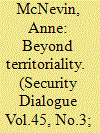

|
|
|
|
|
| Publication |
2014.
|
| Summary/Abstract |
The key contention of this article is that contemporary practices of border security threaten to outrun the explanatory capacity of the spatial (territorial) and subject (citizen/migrant) registers habitually employed to think through human mobility. This represents a political problem as much as an empirical one. First, it implies that migration scholarship deploying categories of analysis informed by prevailing registers offers a limited perspective on contemporary techniques of migration governance; second, it suggests that such scholarship obscures the operation of power that works to enforce profoundly unequal hierarchies of mobility and represent them as politically neutral. In this article, I propose that resisting reversion to problematic categories of analysis offers the potential to think of human mobility without the state and territory as its foremost container concepts. I contend that such an approach - 'beyond territoriality' - is a crucial step on the way to negotiating the normative dimensions of border politics. The case is developed empirically via a grounded investigation of the mundane yet symptomatic practices of border security on the Indonesian island of Bintan.
|
|
|
|
|
|
|
|
|
|
|
|
|
|
|
|
| 3 |
ID:
130412
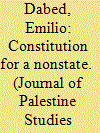

|
|
|
|
|
| Publication |
2014.
|
| Summary/Abstract |
This article sheds new light on the political history of legal-constitutional developments in Palestine in the fourteen years following the Oslo Accord. It examines the relationship between the unfolding social, political, and economic context in which they arose, on the one hand, and PA law-making and legal praxis, on the other. Focusing on the evolution of the Palestinian Basic Law and constitutional regime, the author argues that the "Palestinian constitutional process" was a major "battlefield" for the actors of the Palestinian-Israeli conflict. Thus, changes in the actors' political strategies at various junctures were mirrored in legal-constitutional forms, specifically in the political structure of the PA. In that sense, the constitutional order can be understood as a sort of "metaphoric representation" of Palestinian politics, reflecting, among other things, the colonial nature of the Palestinian context that the Oslo process only rearticulated. This perspective is also essential for understanding the evolution of the Palestinian-Israeli conflict after Oslo.
|
|
|
|
|
|
|
|
|
|
|
|
|
|
|
|
| 4 |
ID:
133614
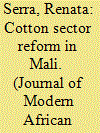

|
|
|
|
|
| Publication |
2014.
|
| Summary/Abstract |
This paper provides a detailed analysis of the cotton sector reform process in Mali from 2000 to 2011, explaining reform delays and ambiguities in terms of the wider political and socio-economic context and aid relationships. Contrary to arguments pointing to lack of state commitment and ownership, domestic stakeholders increasingly worked towards finding an acceptable and consensual reform package. The process encountered quite serious obstacles, however, due to divergent actors' incentives, and the existence of opposing philosophies about what a restructured cotton sector should look like. As a consequence of donors' misjudgement of the political and social realities underlying the Malian cotton sector, dialogue among stakeholders was difficult and polarised, forcing the government to spend considerable time and resources to find a suitable compromise. This paper contributes to a better understanding of the merits and limits of pursuing consensual policy processes against the constraints posed by divergent donors' policy paradigms.
|
|
|
|
|
|
|
|
|
|
|
|
|
|
|
|
| 5 |
ID:
126656
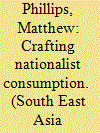

|
|
|
|
|
| Publication |
2013.
|
| Summary/Abstract |
Following the revolution of 1932 that ended absolute monarchy in Siam, a new government came into power that sought to legitimize its rule by encouraging mass identification with the state. Practically, the expansion of a wage economy and the development of a state-led education system were seen by government officials as central to promoting a sense of citizenship to as yet disinterested rural communities. Throughout its first decade in power, the government thus set up projects to provide such groups with skills that might contribute to their overall material advancement. Following the lead of similar endeavours, particularly in India, one of the principal ways in which it would do this was through the production and bringing to market of cotton textiles. However, with foreign imports both superior in quality and cheaper than anything produced internally, the state struggled to establish a public relations message that might convince consumers to purchase Thai-produced textiles. As a result of specific limitations rooted in Thailand's ambiguous status globally, this meant that Thai leaders struggled to replicate the success of such movements elsewhere
|
|
|
|
|
|
|
|
|
|
|
|
|
|
|
|
| 6 |
ID:
131512
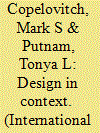

|
|
|
|
|
| Publication |
2014.
|
| Summary/Abstract |
This research note highlights an important element missing from rational design theories of international agreements: "institutional context"-the presence or absence of existing and prior agreements between prospective partners in "new" cooperation. If, as rational design theorists argue, agreement design is deliberate, strategic, and directed toward enhancing contracting parties' ability to credibly commit to future cooperation, then prior design "successes" should influence the terms of additional cooperation. We test for this omitted variable problem in three agreement design outcomes: ex ante limitations on agreement duration, exit clauses, and dispute-settlement provisions. Through an augmentation and reanalysis of data from a key study in the rational design literature-Barbara Koremenos's "Contracting Around International Uncertainty"-we show institutional context is positively correlated with inclusion of ex ante time limitations in negotiated agreements and negatively correlated with the inclusion of exit clauses and third-party dispute-settlement provisions. Institutional context also mediates and conditions the effects of the explanatory variable at the heart of existing rational design theories-uncertainty about the future distribution of gains from cooperation. Our findings show that the collective appeal of particular design features varies not only with the nature of underlying strategic problems, but also with degrees of shared institutional context.
|
|
|
|
|
|
|
|
|
|
|
|
|
|
|
|
| 7 |
ID:
125536


|
|
|
|
|
| Publication |
2013.
|
| Summary/Abstract |
Kosovo's municipal elections in November are the first country wide polls since its declaration of independence. Eoin Ryan and Eric Randolph examine three scenarios for the vote and analyse Belgrade's influence on Kosovo's Serb minority in the north.
|
|
|
|
|
|
|
|
|
|
|
|
|
|
|
|
| 8 |
ID:
130808
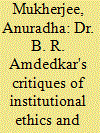

|
|
|
|
|
| Publication |
2014.
|
| Summary/Abstract |
Ethics and morality are the milestones of civilization in the true sense of the term. These concepts again are not static but evolve with greater implications and subtler nuances as humanity strives to grow towards perfection- the ultimate end of existence. ' whether biologically or spiritually. In the context of Indian thought, the traditional, age-old dictums of ethics and morality. having undergone numerous interpretations and changes have experienced a new set of values,' however latent in the traditional interpretation of Dharma or Niri- with the advent of" nationalism, the emergence of a new nation-state and the concurrent vision of human rights. The Constitution of India fully recognizes the moral as at par with the modem, that is, the western ideals of morality in the realization that in the context of Dalit uprising in modern India, the traditional ideals of ethics and morality are to be reviewed. Obviously this shows that what is legal should be ethical and moral or rather. what is ethical and moral tnust have its place in law. It is from this perspective that the modern-day Dalit struggle against injustices, age-old as they are. are to be seen and Dr.B.R. Ambedkar's initiation to this struggle was aimed at bringing ethics and morality to work at the state level, subjugating the Nili forest while lawgivers to take a backseat before the universal laws of morality. To understand Ambedkar's stand on the place of ethics and morality in Hinduism, one must see the reasons that made him strike out at the roots of Hindu social ethics. The Hindu social life was traditionally ruled by Dilemma. Dharma guided a Hindu's'Iife from birth to death by a set of rules strictly laid out for everyone in society. The observation of these rules was morality and the underlying ethics of these duties and rights was ?rst ofall, societal good, i.e., good for 'all. The second part of this ethics was that by observing this social morality, an individual will attain perfection. In accordance with these concepts, the Dharmas/zastras dictate the functions ofthe state and the king. The Nili and Dandanili emanate from one source and with one ideal- that is to maintain the social order by arranging for the speci?c duties of each and every member of society. Consequently. rights came as group rights and institutional rights as laid out in the Dharamshastra'. And over and above everything was the belief in the law of Karma that sanctified the rule of l/Z7I'l7aS/1I'uII7(l, or ones station in life as prescribed by onc's birth. These two essential features of Hindu society made it a highly stratified one so that the passage of' centuries only tightened the rules and the rituals pertaining to these two rules. The solemn and noble hymns of Rigveda. where the philosophy of Vedic seers and poets as the world being one and where everyone was the other's kin. I Va.t'zzdlmibu Kzzrumba/(um )' is the spirit of the ancient Indian Vedic realization. The utmost ideals of human dignity with the universal ethics of righteous behavior and the universal morality of conscientious behavior were preached in their fullest glory. . '
|
|
|
|
|
|
|
|
|
|
|
|
|
|
|
|
| 9 |
ID:
133285
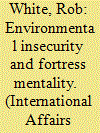

|
|
|
|
|
| Publication |
2014.
|
| Summary/Abstract |
This article explores the political, economic and ecological context within which environmental insecurity emerges and feeds back into a fortress mentality. Shortages of food, water and energy sources are the trigger for nefarious activities involving organized criminal networks, transnational corporations and governments at varying political levels. The consequences of such activities contribute to even more ruthless exploitation of rapidly vanishing natural resources, as well as the further diminishment of air, soil and water quality. These developments, in turn, exacerbate the competitive scramble by individuals, groups and nations for what is left. The accompanying insecurities and vulnerabilities ensure elite and popular support for self-interested 'security'. Accordingly, the 'fortress' is being constructed and reconstructed at individual, local, national and regional levels-as both an attitude of mind and a material reality. Fundamentally, the basis for this fortress mentality is linked to decades of neo-liberal policy and practice that have embedded an individualizing and competitive self-interest that, collectively, is overriding prudent and precautionary policy construction around climate change and environmental degradation. The net result is that security is being built on a platform of state, corporate and organized group wrongdoing and injustice, in many instances with the implied and/or overt consent of relevant publics. Yet, as long as the fortification continues apace, it will contribute to and further exacerbate varying levels of insecurity for all.
|
|
|
|
|
|
|
|
|
|
|
|
|
|
|
|
| 10 |
ID:
128291
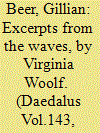

|
|
|
|
|
| Publication |
2014.
|
| Summary/Abstract |
Here is a hall where one pays money and goes in. where one hears music among somnolent people who have come here after lunch on a hot afternoon. We have eaten beef and pudding enough to live for a week without tasting food. Therefore we cluster like maggots on the back of something that will carry us on. Decorous, portly - we have white hair waved under our hats: slim shoes: little bags: clean-shaven cheeks: here and there a military moustache. not a speck of dust has been allowed to settle anywhere on our broadcloth. Swaying and opening programmes. with a few words of greeting to friends. we settle down. like walruses stranded on rocks. like heavy bodies incapable of waddling to the sea. hoping for a wave to lift us. but we are too heavy. and too much dry shingle lies between us and the sea. We lie gorged with food, torpid in the heat. Then. swollen but contained in slippery satin. the sea-green woman comes to our rescue. She sucks in her lips. assumes an air of intensity. in?ates herself and hurls herself precisely at the right moment as if she saw an apple and her voice was the arrow into the note. 'Ah !' "An axe has split a tree to the core: the core is
warm: sound quivers within the bark. 'Ab.' cried a woman to her lover, leaning from her window in Venice. 'Ah. Ah !' she cried. and again she cries 'Ah !' She has provided us with a cry. But only a cry. And what is a cry? Then the beetle-shaped men come with their violins: wait; count; nod; down come their bows. And there is ripple and laughter like the dance of olive trees and their myriad-tongued grey
|
|
|
|
|
|
|
|
|
|
|
|
|
|
|
|
| 11 |
ID:
131511
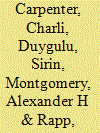

|
|
|
|
|
| Publication |
2014.
|
| Summary/Abstract |
Through a series of focus groups with human security practitioners, we examined how powerful organizations at the center of advocacy networks select issues for attention. Participants emphasized five sets of factors: entrepreneur attributes, adopter attributes, the broader political context, issue attributes, and intranetwork relations. However, the last two were much more consistently invoked by practitioners in their evaluations of specific candidate issues. Scholars of global agenda setting should pay particular attention to how intranetwork relations structure gatekeeper preferences within transnational advocacy spaces because these help constitute perceptions of issues' and actors' attributes in networks.
|
|
|
|
|
|
|
|
|
|
|
|
|
|
|
|
| 12 |
ID:
142221
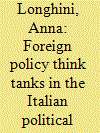

|
|
|
|
|
| Summary/Abstract |
This paper explores the current state of foreign policy think tanks in Italy through an in-depth analysis of its main protagonists. These actors are not always immediately recognizable because the sector is not regulated and little data is publicly accessible. Empirically, the analysis is conducted through a web survey, in-person interviews, and a reputational analysis of seven organizations. This work not only identifies who these actors are and what they do, but it does so taking into account the political context. Such an institutional argument suggests that foreign policy think tank ties to the Italian political system are essential. At the same time, those ties pose serious limitations for the evolution of these organizations, especially in a transnational perspective.
|
|
|
|
|
|
|
|
|
|
|
|
|
|
|
|
| 13 |
ID:
128290
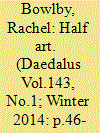

|
|
|
|
|
| Publication |
2014.
|
| Summary/Abstract |
In this piece. I look at an essay that l have probably read too often not to find in it the key to all matters
aesthetic, historical. philosophical, and more. The essay is Charles Baudelaire°s Le Peintre de la vie modeme (The Painter of Modern Life), first published in 1863 and written, most probably, around 1859 to 1860. Baudelaire's exhilarating innovation is to down- play the signi?cance of eternal value in art. in favor of what he designates as its other half, the ?eeting presentness that is modernity. My essay is unapologetically an appreciation - for the most part - of a text that, in focusing on another artist, itself appears to be just that.' For Baudelaire develops his arguments through a mock-anonymous celebration of the artist Constantine Guys, referred to as M. G. (Monsieur G.). Guys's proli?c sketches, done at speed, for rapid journal publication, chart the smallest of day-by- day changes and typical scenes in contemporary life. Guys's pictures - the art of modernity - give to the day a second life. and "translate" into a different medium - from sight to (mental) impression to its "rebirth" as a sketch - that which would otherwise be lost with its passing.
|
|
|
|
|
|
|
|
|
|
|
|
|
|
|
|
| 14 |
ID:
128294
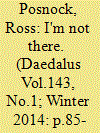

|
|
|
|
|
| Publication |
2014.
|
| Summary/Abstract |
Perhaps, like me. you have a propensity to collect books without quite knowing why. Over the years I have piled up books by and about, say, Ludwig Witt- genstein, Hannah Arendt, George Santayana, Philip Roth, Ad Reinhardt, Philip Guston, Franz Rosen- zweig, Penelope Fitzgerald, Thomas Bernhard - and not only not read them, but have no desire to do so. I have kept busy working on other things. And for a decade or two at a time. these texts simply gather dust on my shelves. But then, inevitably. I am drawn to these nearly forgotten volumes and. strangely, they prove pivotal to a new project: l recall. for instance, that Santayana ascended, literally, from the obscurity of a low shelf to earn a chapter in my book on William and Henry James. Wittgenstein made an analogous, if more circuitous, journey from the shadows, waiting untouched, until five years ago when I kept a long-held inner vow to read an- other languishing tome, one that had stared me down so often it had acquired an aura of intimidation: Stanley Cavell's The Claim of Reason: Wittgen-stein, Skeptirism, Morality and Tragedy. It was indeed intimidating. but also inspiring: that experience opened the door to more Cavell - and to deeper engagements with Emerson - and to Wittgenstein, who has joined the sage of Concord as a central ?gure in my current project on writers. artists. and philosophers who renounce their careers. The peculiarities of this manner of book buying - the absence of full consciousness and the long gap between acquisition and reading - puts me in mind
|
|
|
|
|
|
|
|
|
|
|
|
|
|
|
|
| 15 |
ID:
124788
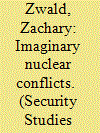

|
|
|
|
|
| Publication |
2013.
|
| Summary/Abstract |
Although the question of how policymakers arrive at their nuclear doctrine and force structure preferences is one of unparalleled importance, it has not received systematic attention in international relations. This article, therefore, develops and illustrates a behavioral model of nuclear deterrence preference formation wherein variation in such preferences is a function of the content and flexibility of one's theory-driven thinking. A policymaker determines the value of potential doctrine and force structure positions in the context of his or her beliefs about the nature of how nuclear conflict will likely begin and proceed-i.e., whether more as a result of rational and deliberate action or due to fear, misperception, and accident. This analysis challenges the dominant explanations of doctrine and force structure preference formation that are implicit in IR. It suggests how the dialogue of the deaf in domestic debates over nuclear weapons policy can be reduced in the future and provides new criteria by which to recast the proliferation optimist-pessimist debate.
|
|
|
|
|
|
|
|
|
|
|
|
|
|
|
|
| 16 |
ID:
124880
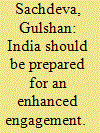

|
|
|
|
|
| Publication |
2013.
|
| Summary/Abstract |
Irrespective of what happens between Afghanistan and the US on bilateral security agreement as well as on the Afghan peace process, it is clear that a new phase in the Afghanistan project is going to begin from 2015. Within this context, most analysts and international reports indicate that, in the post-2014 phase, the country is going to face major challenges in three major areas: security, political and economic. Enhanced Indian engagement in Afghanistan could help the country meet the difficult challenges in all these areas during its decade of transformation (2015?2024).
|
|
|
|
|
|
|
|
|
|
|
|
|
|
|
|
| 17 |
ID:
128126
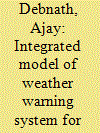

|
|
|
|
|
| Publication |
2013.
|
| Summary/Abstract |
the estuarine system of the Ganga-Brahmaputra deltaic region form the largest mangrove eco-system in the world shared between India and Bangladesh approximately in the proportion on 60:40, Sir William Wilson Hunter in his 'A Statistical Account' of Bengal (1875) writes, " The Sundarvan may described as a tangle region of estuaries, rivers and water courses, enclosing a vast number of island of various shapes and size, it has been declared as a world heritage site by UNESCO
|
|
|
|
|
|
|
|
|
|
|
|
|
|
|
|
| 18 |
ID:
128311
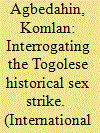

|
|
|
|
|
| Publication |
2014.
|
| Summary/Abstract |
This article, is about an attempt by women in Togo to use a sex strike to end the country's political impasse. The concept dates back to the ancient Greek comedy Lysistrata by Aristophanes, first presented publicly in 411 b.c. More recently, a sex strike had been used with some success in Liberia that inspired Togolese women to attempt this method of non-violent action. The Togolese experiment, however, ended in failure. This article discusses reasons for the failure, including inadequate preparation and miscommunication and the neglect of the political, economic, and social context of Togo.
|
|
|
|
|
|
|
|
|
|
|
|
|
|
|
|
| 19 |
ID:
133108
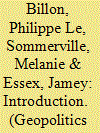

|
|
|
|
|
| Publication |
2014.
|
| Summary/Abstract |
This special issue of Geopolitics focuses on recent shifts in the geopolitics of agro-food systems linked to debates around a new 'Global Food Crisis' and its implications for (trans)national political agendas. Spurred since 2006 by rising food prices, large-scale farmland acquisitions, and growing public protests, these concerns have motivated new streams of development assistance and reforms to global governance processes, as well as strengthened activism by agrarian social movements. While governments and civil society organisations have struggled with how best to address the realities of worsening food insecurity, the discourse of crisis has simultaneously helped to actively reposition food security as an object of urgent geopolitical calculation and strategy. The stubborn grip of continuing poverty and hunger has prompted many observers to envision a future in which chronic food insecurity and associated political and economic disorder are the new normal.
|
|
|
|
|
|
|
|
|
|
|
|
|
|
|
|
| 20 |
ID:
141346
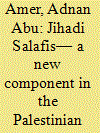

|
|
|
|
|
| Summary/Abstract |
This study is published at a time when the Gaza Strip is undergoing accelerated changes with the growth of Jihadi1 Salafi streams in Egypt, mainly in the Sinai Peninsula, which shares long borders with Gaza. Consequently, Gaza is vulnerable to all major events following the armed attacks launched by Salafi groups against the Egyptian army in late June and early July 2015.
|
|
|
|
|
|
|
|
|
|
|
|
|
|
|
|
|
|
|
|
|